Category Archives: Allergist for Skin Conditions
Allergies and Skin Conditions: NYC Allergist Solutions
Do you want to learn more about allergies and skin conditions? Allergies don’t just stop at sneezing and watery eyes; they can also wreak havoc on your skin. In the bustling urban environment of New York City, where allergens are abundant, skin conditions related to allergies are more common than you might think.
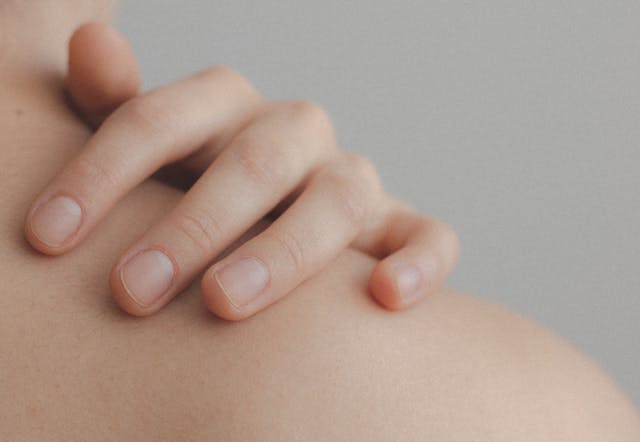
The Connection Between Allergies and Skin Conditions
Allergies can trigger or exacerbate a range of skin conditions, including:
1. Eczema (Atopic Dermatitis)
Eczema is a chronic skin condition characterized by itchy, inflamed skin. Allergens like pollen, dust mites, pet dander, and certain foods can trigger eczema flare-ups in sensitive individuals.
2. Hives (Urticaria)
Hives are itchy, raised welts on the skin that can appear suddenly and often occur as an allergic reaction to foods, medications, insect stings, or environmental allergens.
3. Contact Dermatitis
Contact dermatitis occurs when the skin comes into direct contact with an allergen, such as certain metals, fragrances, or plants. It results in redness, itching, and sometimes blisters at the site of contact.
Solutions for Allergy-Related Skin Conditions
Allergists offer comprehensive solutions to address allergies and related skin conditions:
1. Accurate Allergy Testing
Accurate diagnosis is the first step to managing allergies and skin conditions. Allergists utilize advanced allergy testing methods, including skin prick tests and blood tests, to identify the specific allergens triggering your skin symptoms.
2. Allergen Avoidance
Once allergens are identified, your doctor provides practical guidance on allergen avoidance strategies. This may include dietary restrictions, environmental controls, and lifestyle adjustments to reduce allergen exposure.
3. Medication Management
Allergy-related skin conditions can often be managed with medications such as antihistamines and topical corticosteroids. Your allergist will prescribe the most appropriate medications to relieve your symptoms.
4. Immunotherapy (Allergy Shots)
For long-term relief, immunotherapy, commonly known as allergy shots, may be recommended. Immunotherapy gradually desensitizes your immune system to specific allergens, reducing your body’s overreaction to them and lessening skin reactions.
Allergies and Skin Conditions: Contact NYC’s Top Allergist
Dr. Boyan Hadjiev is dedicated to helping NYC residents find relief from allergies and related skin issues. Schedule an appointment today and take the first step toward healthier, itch-free skin with the support of NYC’s top allergist.
Allergy, Asthma and Sinusitis P.C
Boyan Hadjiev, MD
30 East 40th Street
Suite 1200
New York, NY 10016
212-319-5282
Eczema and Allergies: Understanding the Connection and Treatment Options
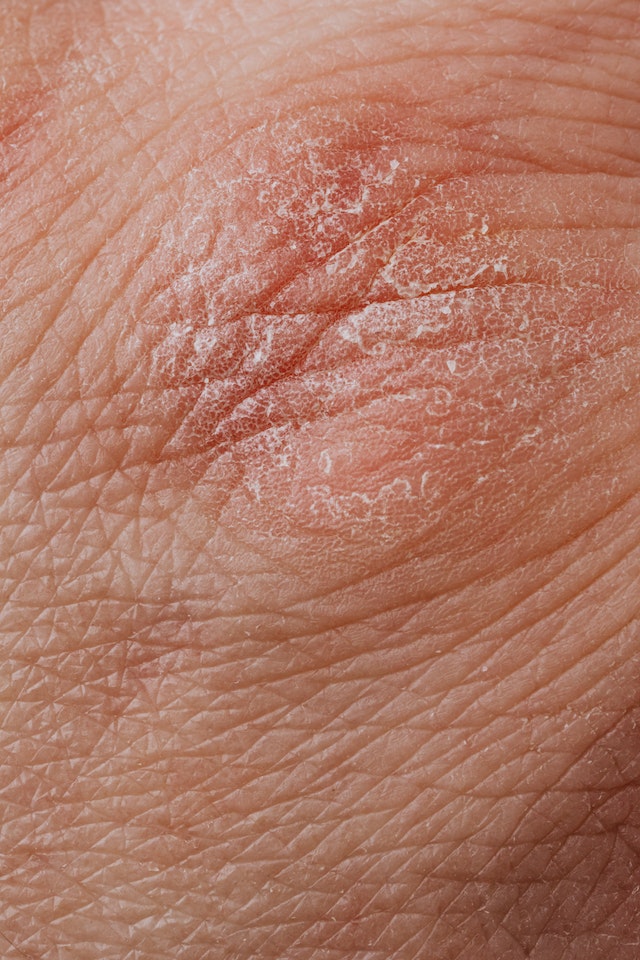
If you or someone you love is experiencing eczema, you may wonder if allergies play a role. Eczema is a common skin condition that causes red, itchy, and inflamed skin. It affects people of all ages and can be caused by a variety of factors, including genetics, environmental factors, and lifestyle choices. In this blog post, we will explore the connection between eczema and allergies and discuss treatment options.
What is Eczema?
Eczema, also known as atopic dermatitis, is a chronic skin condition that causes patches of dry, itchy, and inflamed skin. It can appear anywhere on the body, but is most commonly found on the hands, feet, face, neck, and upper chest. Eczema can be caused by a combination of genetic and environmental factors. It is often associated with other atopic conditions, such as asthma and hay fever.
The Connection Between Eczema and Allergies
Allergies and eczema are closely related. In fact, many people with eczema also have an allergic condition. This is because eczema is often triggered by allergens, such as pollen, dust mites, and pet dander. When an allergen comes into contact with the skin, it can cause an immune system reaction that leads to eczema symptoms. In addition to environmental allergens, certain foods can also trigger eczema symptoms in some people.
Allergy Testing for Eczema
If you have eczema, it is important to identify any underlying allergies that may be contributing to your symptoms. Allergy testing can help determine what allergens you are sensitive to. There are a few different types of allergy tests, including skin prick tests, blood tests, and patch tests. Your allergist can recommend which type of test is best for you.
Treatment Options
Treatment for eczema and allergies may involve a combination of approaches, including avoidance of triggers, medications, and lifestyle changes. Here are some common treatment options:
Avoiding Triggers
If you have identified specific allergens that trigger your eczema, avoiding them is an important step in managing your symptoms. This may involve using air purifiers, washing bedding frequently, and avoiding certain foods.
Medications
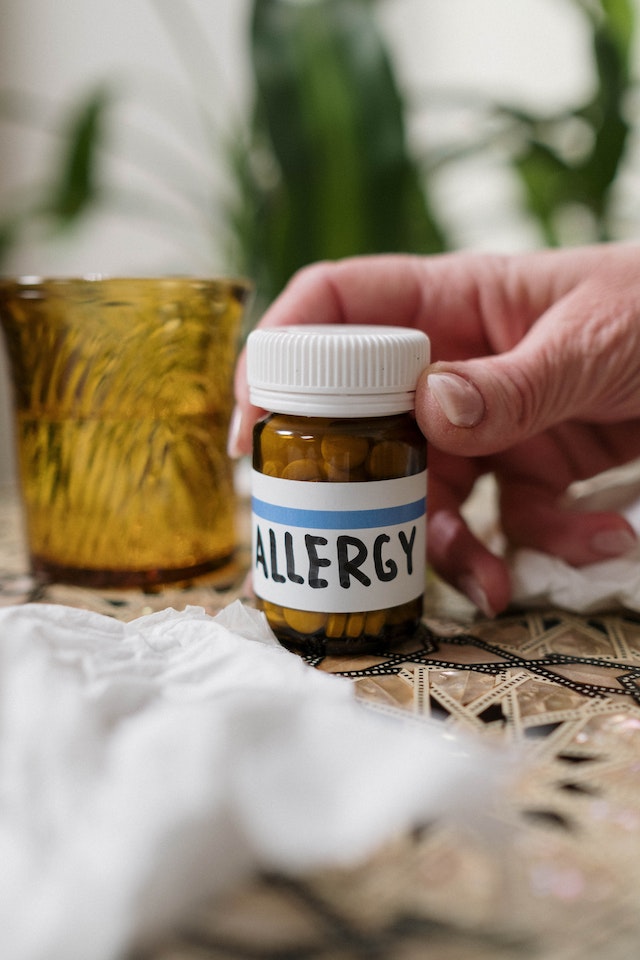 There are several medications that can be used to treat eczema and allergies. Antihistamines can help relieve itching and inflammation, while corticosteroids can reduce inflammation and redness. Topical immunomodulators can also be used to reduce inflammation.
There are several medications that can be used to treat eczema and allergies. Antihistamines can help relieve itching and inflammation, while corticosteroids can reduce inflammation and redness. Topical immunomodulators can also be used to reduce inflammation.
Lifestyle Changes
Making lifestyle changes can also help manage eczema and allergies. Keeping the skin moisturized with creams and ointments can help prevent dryness and reduce itching. Avoiding harsh soaps and detergents can also help prevent flare-ups.
Allergy Immunotherapy
Allergy immunotherapy, also known as allergy shots, is a treatment option for people with allergies. It involves receiving regular injections of allergens to help the body build up immunity. This can help reduce the severity of allergy symptoms over time.
Allergies & Skin Conditions: Conclusion
Eczema and allergies are closely related, and identifying and managing underlying allergies is an important step in managing eczema symptoms. If you are experiencing eczema or suspect that you have underlying allergies, it is important to seek the advice of a qualified allergist, such as Dr. Boyan Hadjiev.
Also known as “Dr. Sneeze”, Dr. Hadjiev is a board-certified allergist located in New York City who has years of experience diagnosing and treating eczema and allergies. Dr. Hadjiev takes a personalized approach to care, working closely with each patient to develop a treatment plan that is tailored to their unique needs and lifestyle.
If you are struggling with eczema and allergies, don’t suffer in silence. Contact Dr. Boyan Hadjiev at Allergy, Asthma and Sinusitis P.C. to schedule an appointment and take the first step towards finding relief.
Allergy, Asthma and Sinusitis P.C
Boyan Hadjiev, MD
30 East 40th Street
(Btwn Madison and Park)
Suite 1200
New York, NY 10016
212-319-5282
What Causes Allergic Reactions On Skin?
What are the causes of allergic reactions on your skin? The body has a complex immune system. When the immune system works fine, the cells responsible for immunity will defend you from toxic substances and alert you about the threat. However, when your body’s immune system doesn’t work correctly due to a disease or in normal condition, your immune cells will consider certain substances to be a threat and initiate a reaction. These substances are allergens.
You may react to allergens by consuming, touching, or breathing certain substances, leading to reactions on the skin. According to AAAAI or American Academy of Allergy, Asthma and Immunology, 50 million people suffer from one or another allergic condition in the US. An immunologist can use triggering allergens to test how you react to various substances. They will inject allergens in your body to see a reaction. Then, they diagnose you with an allergy. Furthermore, they also use various allergens for treatment.
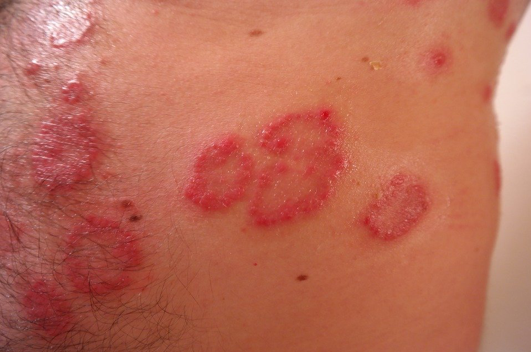
(Source)
Causes of Allergic Reactions on Skin
Our body’s skin acts as a defense mechanism and keeps any threats from entering the body. Human skin contains various special cells that provide immunity and protect the skin and the body from viruses, bacteria, and other dangerous pathogens.
When our skin detects an unknown substance that might cause a threat, they react and inflame the infected area. This inflammation is dermatitis or a rash, which can lead to itching and sore.
The reaction depends on the immune cells, the substance, and how they react to something. Sometimes, your infection or health condition leads to allergies. Rashes can be of various types. You may experience irritation, patches or blisters, redness or pain in the infected area. Itchiness can be of various types. It may occur in a specific region or all over the body and can be a symptom of various conditions. Here are some causes of allergic reactions:
1. Nickel
Various items have nickel construction, such as cutlery and jewelry. Nonetheless, many people experience an allergic reaction to this material. When they come into contact with the material, their skin starts to rash and turn red and itchy. You are prone to this allergy if you work as a house cleaner, caterer, retail clerk, hairstylist, or your tasks include interacting with various metal items.
This allergy is non-treatable. Of course, you need to avoid any contact with this material if you know or experience any reaction towards it. If you want to wear nickel-based accessories, add a layer of nail paint to create a barrier between your skin and nickel, avoiding direct interactions.
2. Poison Sumac, Oak, and Ivy
Oil from these plants is very reactive to the skin. The leaves release the oil, urushiol when they suffer from bruising or damage. When your skin comes in contact with the oil, it initiates an allergic reaction by turning itchy and red. Urushiol will cause blisters, bumps, and rashes. You can treat the reaction in various ways. For instance, you can apply a wet cloth, oatmeal bath, hydrocortisone cream, and calamine lotion. However, you should visit the immunologist immediately before the condition gets worse.
3. Medications
You may have noticed that after taking various medications, you experience itchy skin and rashes all over your body. Itchiness and rashes are a result of skin allergic reactions. Some ointments can lead to symptoms like itchiness as well. The allergic reaction indicates that the ingredients are not suitable for your skin type or your allergic condition. Hence, you need to consult an immunologist to determine what items and materials you are allergic to.
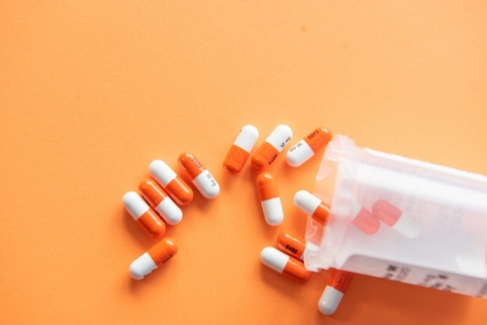
(Source)
4. Fragrances
Fragrances are the main components of deodorant, cologne, and perfume. You use such products to conceal unpleasant smells. You can also find this product in soaps and other skincare products. You may find difficulty choosing a product when you have a fragrance allergy, as most products do not include fragrance as an ingredient. Companies even add a small quantity of fragrance in unscented products. Physical therapists and massage therapists are more likely to develop skin allergy to fragrance as they consistently use products containing fragrance.
5. Preservatives
Various ingredients in beauty products are reactive to your skin. Two examples are formaldehydeparabens and releaser. Although these products make the product long-lasting, your skin may be reactive to these products. These products usually present in the following items with the names quaternion-15, PABA, isothiazolinone, Diazolidinyl urea, bromonitropropane:
- Stickers and fake tattoos
- Cosmetic items
- Hair dye
- Sunscreens
- Moisturizers and lotions
- Shampoos and conditioners.
Before buying products, always check the ingredients. If you are not allergic to these types of preservatives, you can rely on these products naturally.
Causes of Allergic Reactions on Skin: Conclusion
Allergists & immunologists have education and practice in handling conditions related to the immune system, such as allergic reactions. They can diagnose you and check for which items trigger an immune response and lead to skin reactions.
Are you looking for a top immunologist in New York City? If so, give us a call at 212-319-5282. Visit Dr. Boyan Hadjiev, better known as Dr. Sneeze, for a consultation on treating & controlling the allergic reaction on your skin.
Boyan Hadjiev, MD
30 East 40th Street
Suite 1200
New York, NY 10016
212-319-5282
Sources
https://www.healthline.com/health/allergies/allergic-reaction#causes
https://www.webmd.com/allergies/skin-allergies-causes
https://www.medicalnewstoday.com/articles/311473#causes
Are You At High Risk For A Latex Allergy?
Allergies are commonplace in modern society. In fact, in some cases, the numbers are actually increasing annually. The allergies are of different types – although all are a form of autoimmune system response. Some such as food allergies are very common; others such as allergic reactions to latex are not. Yet, while the risk for latex is not high, it is still affects approximately 1% of Americans.
What Is Latex and Latex Allergy?
Latex is the sap of the Brazilian rubber tree. The actual proteins in the sap can trigger an allergic response. In addition, the chemicals added to the latex can work with the proteins to create symptoms. As a form of contact dermatitis, latex allergy displays certain symptoms.
Some people may feel tightness in the chest as well as wheezing and difficulty in breathing. Like other forms of allergies, a latex allergy can induce anaphylaxis. This response may or may not be immediate. Unlike many allergies, the initial response is not always immediate. A latex allergy usually develops following ongoing exposure to various latex products.
What Contains Latex?
Latex is a major or sole contributor to the basis of many different products. These include:
-
- Baby and children’s items including rubber toys, infant bottle nipples and pacifiers
- Balloons
- Carpet backing
- Contraceptives
- Cushions
- Medical or surgical gloves
- Pillows
- Waterproof clothing
If you handle these objects repeatedly, you may become allergic displaying certain indicatory symptoms. However, in some instances, if the latex particles become airborne, they can trigger an allergic response.
Are you at High Risk for a Latex Allergy?
You are at if you work in certain occupations where exposure is constant and consistent. These include, of course, various health care providers including personal care workers, nurses, doctors, surgeons, emergency responders and those with similar jobs. In fact, statistics indicate that between 8 and 12 percent of all American health care workers will actually get a latex allergy.
You may also be at high risk for latex allergies if you work in the sectors manufacturing latex or latex products. In some ways, this can be more dangerous for someone who has developed an allergy to the material. In this type of working environment, the particles of latex may become float in the air. In certain circumstances, they can enter the actual lungs of an individual with allergies and cause a reaction.
Call our offices at 212-319-5282 to schedule an appointment with the best allergist in New York City.
Allergic Skin Conditions
What are Allergic Skin Conditions – Allergic Contact Dermatitis
 Allergic contact dermatitis is a skin condition that appears in people who are hypersensitive to certain substances. When these people come in contact with those substances, an allergic reaction appears on their skin. The initial contact with a substance that is an allergen is not usually followed by a break-out of symptoms; the symptoms appear on the second and subsequent exposures. After the contact, the immune system overreacts in its response to what is perceived to be an attack.
Allergic contact dermatitis is a skin condition that appears in people who are hypersensitive to certain substances. When these people come in contact with those substances, an allergic reaction appears on their skin. The initial contact with a substance that is an allergen is not usually followed by a break-out of symptoms; the symptoms appear on the second and subsequent exposures. After the contact, the immune system overreacts in its response to what is perceived to be an attack.
With the allergic process, a number of chemicals are released, including histamines, which cause an inflammation. Allergic contact dermatitis is not a life-threatening condition, however, a visit to an allergy doctor may be needed to determine the allergen and get advice on the treatment.
Causes of allergic contact dermatitis
Allergic contact dermatitis can be caused by coming in contact with a number of allergens, some of which are:
-
Nickel, gold, and chromium
-
Balsam of Peru, used in production of lotions and perfumes
-
Neomycin and bacitracin, topical antibiotics
-
Allergens that trigger allergic contact dermatitis found in cosmetic products and jewelry
-
Citrus fruit, the peel especially
-
Other plants, such as poison ivy or poison oak
Symptoms of allergic contact dermatitis
Symptoms of allergic contact dermatitis include:
-
A rash on the skin in the area that came into contact with the allergen
-
Itchy skin
-
Skin redness, and possible oozing, drainage, or scaly skin
Allergic dermatitis symptoms usually appear sometime after coming into contact with the allergen. The area that came into contact with the allergen is usually the area where the symptoms appear and they usually start off with an itchy rash, this may ooze or drain. The skin on the area may become scaly. Sometimes it will only be a little red or it can be blistery. The area can swell and feel warm.
Treatment of allergic dermatitis
Allergic contact dermatitis is an incurable condition. After the first exposure to the allergen, the person will have an allergic reaction after every subsequent contact for the rest of their life. The treatment options are aimed at managing the symptoms. An allergist may prescribe the following courses of treatment:
-
Topical corticosteroids – These are the most commonly used treatment for mild to moderate cases.
-
Oral steroids and antihistamines – These are used in more severe cases.
The mildest cases of allergic contact dermatitis usually don’t require any medical treatment. The area should be gently wiped with a damp cloth to make sure all of the allergen is removed from the skin. Topical corticosteroids are used to reduce inflammation in mild to moderate cases, but they should be applied with caution because of their side-effects. Severe cases require steroid and antihistamines to be introduced orally.
Serving all of New York City and the Tri State Area including Zip Codes: Top Allergist NYC Midtown, Chelsea and Clinton: 10001, 10011, 10018, 10019, 10020, 10036 | Gramercy Park and Murray Hill: 10010, 10016, 10017, 10022 | Greenwich Village and Soho: 10012, 10013, 10014 | Lower Manhattan: 10004, 10005, 10006, 10007, 10038, 10280 | Lower East Side: 10002, 10003, 10009 | Upper East Side: 10021, 10028, 10044, 10128 | Upper West Side: 10023, 10024, 10025

